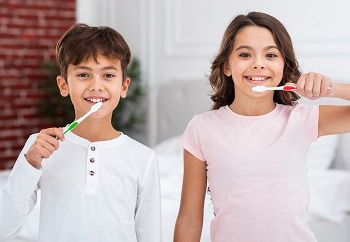A Parent's Guide to Children's Oral Health: Tips for Healthy Teeth
As a parent, ensuring your child's oral health is essential for their overall well-being. Establishing good oral care habits early on can lead to lifelong healthy teeth and gums. In this blog, we will provide practical tips and valuable information to help you navigate the world of children's oral health, from brushing techniques and diet tips to managing dental emergencies and encouraging positive oral care habits. So, let's learn how to keep your child's smile bright and healthy!
Why is children's oral health important?
Children's oral health is essential for several reasons:
- Early Development: Proper oral care during childhood is critical for developing healthy teeth and gums. It sets the foundation for good oral health habits that can last a lifetime.
- Prevention of Dental Issues: Establishing good oral care habits early on can help prevent common dental issues such as cavities, gum disease, and tooth decay. This can save children from pain, discomfort, and the need for extensive dental treatments in the future.
- Nutrition and Speech Development: Healthy teeth are essential for proper chewing, biting, and speech development in children. Bad oral health can affect a child's ability to eat a balanced diet and communicate effectively.
- Overall Health: Oral health is c to overall health. Poor oral hygiene in children may increase the risk of various health issues, including diabetes, respiratory infections, cardiovascular disease, etc.
- Financial and Emotional Burden: Dental treatments for children can be costly, and the emotional impact of dental issues on children, such as toothaches or dental anxiety, can be significant. Parents can help minimize these burdens and promote well-being by prioritizing children's oral health.
- Lifelong Habits: Establishing good oral care habits early in life can create a strong foundation for lifelong habits. Children who learn the importance of oral health at a young age will likely continue practicing good oral care into adulthood, leading to better oral health outcomes in the long run.

Building Good Oral Care Habits: Tips for Parents
Good oral care habits are essential for children to maintain optimal oral health. As a parent, you play a crucial role in teaching and reinforcing these habits. Following are some practical tips that can help you establish and maintain good oral care habits for your child:
- Start Early: Begin caring for your child's oral health even before their first tooth emerges. Clean their gums with a soft cloth or an infant toothbrush to remove bacteria and familiarize them with oral care routines.
- Brush Regularly: Once your child's first tooth emerges, brush them with fluoride toothpaste twice daily. Use a soft-bristled toothbrush and a pea-sized amount of toothpaste. Brush all sides of the teeth and gums in gentle, circular motions.
- Supervise Brushing: Young children may need help brushing until they can effectively brush their teeth. Supervise their brushing to ensure they brush for at least two minutes and reach all areas of their mouth.
- Floss Daily: When your child has two teeth that touch, start flossing them daily. This helps to remove plaque from between the teeth and along the gumline. Use floss picks or child-friendly flossing tools to make it easier and more enjoyable for your child.
- Limit Sugary Foods and Drinks: Sugar significantly contributes to tooth decay. Encourage healthy snacks like fruits, vegetables, and dairy products. Limit your child's sugary foods and drinks, such as candies, cookies, soda, and fruit juices.
- Visit the dentist Regularly: Schedule regular dental check-ups for your child, starting around their first birthday or as your dentist recommends. Regular dental visits can help detect and prevent dental issues early on.
- Lead by Example: Be a positive role model for your child by practicing good oral care habits. Brush and floss your teeth regularly and demonstrate healthy eating habits to encourage your child to follow suit.
- Make it Fun: Turn oral care into an enjoyable activity for your child. Use toothbrushes and toothpaste with their favorite characters, play their favorite songs during brushing time, and use stickers or reward charts to motivate and celebrate their efforts.
The Role of Diet in Children's Oral Health: Foods to Encourage and Avoid
A child's diet plays a significant role in oral health. The foods they eat can impact the health of their teeth and gums. Here's a guide to foods that can promote healthy teeth and gums and those that should be avoided:
Foods to Encourage
- Calcium-Rich Foods: Calcium is essential for building strong teeth and bones. Encourage your child to eat calcium-rich foods like milk, cheese, yogurt, and leafy greens like spinach.
- Fruits and Vegetables: Fruits and vegetables are high in fiber, which can help clean teeth and promote saliva production, which helps neutralize harmful acids in the mouth. Encourage your child to eat different colored fruits and vegetables.
- Water: Water is the best drink for promoting oral health. It helps rinse away food particles and neutralizes harmful acids in the mouth.
- Nuts: Nuts are a great source of protein and minerals like calcium and phosphorus, essential for building strong teeth.

Foods to Avoid
- Sugary Foods and Drinks: Sugary foods and drinks can lead to tooth decay and cavities. Limit your child's candy, soda, fruit juice, and other sugary treats intake.
- Sticky Foods: Sticky foods like gummy candies and dried fruits can stick to teeth and increase the risk of tooth decay.
- Acidic Foods: Acidic foods like citrus fruits and tomatoes can erode tooth enamel, making teeth more susceptible to decay.
- Starchy Foods: Starchy foods like potato chips and bread can stick to teeth and promote the growth of harmful bacteria in the mouth.
In addition to promoting healthy food choices, it's essential to encourage good eating habits, such as avoiding grazing on snacks throughout the day and encouraging regular meals and snacks at specific times. Drinking water after meals and snacks can also help rinse away food particles and neutralize harmful acids in the mouth.
A balanced and healthy diet can promote good oral health in children. Encouraging a diet rich in calcium, fruits, and vegetables while limiting sugary, sticky, acidic, and starchy foods can help your child maintain healthy teeth and gums. Remember to consult your child's dentist for personalized dietary recommendations based on their needs.
How do Parental Oral Health Habits Impact Children's Dental Health?
As a parent, you play an essential role in teaching your child good oral health habits. However, did you know oral health habits can also significantly impact your child's dental health? Here's why setting a positive example is crucial for your child's oral health:
- Children Learn by Imitation: Children learn by observing and imitating their parents' behaviors. If you prioritize oral health by brushing and flossing regularly, your child is likelier to adopt these habits.
- Good Habits Benefit the Whole Family: When everyone in the family prioritizes good oral health habits, it can benefit the entire household. Healthy habits like regular brushing and flossing can help prevent dental problems and save money on costly dental treatments in the long run.
Here are some tips for setting a positive example for your child:
- Prioritize Your Oral Health: Make sure you brush and floss regularly, visit the dentist for check-ups, and avoid unhealthy oral habits like smoking or excessive alcohol consumption.
- Involve Your Child in Your Oral Care Routine: Make oral care a family activity by brushing and flossing together. Encourage your child to help choose toothpaste flavors or pick out a fun toothbrush.
- Promote Healthy Habits: Encourage healthy eating habits and limit sugary foods and drinks. Emphasize the importance of drinking plenty of water and chewing sugar-free gum to promote saliva production and neutralize harmful acids in the mouth.
By setting a positive example for your child and prioritizing good oral health habits for the whole family, you can help your child establish a strong foundation for lifelong oral health.
Conclusion
In conclusion, good oral health habits are essential for children and parents. By following the tips in this guide, parents can help their children maintain healthy teeth and gums and set a positive example for a lifetime of good oral health. Parents can take many simple steps to improve their children's dental health, from establishing a regular oral care routine to promoting healthy eating habits. So, implement these tips today and prioritize oral health for your family! Remember, prioritizing good oral health for yourself and your family prevents dental problems and promotes overall health and well-being.
Contact your Danville dentist, Dr. Hoss Abar, DDS, MSD, at Danville Orthodontics to learn about Children's Oral Health.
Resource:
How dental anxiety affects your oral health?
*This media/content or any other on this website does not prescribe, recommend, or prevent any treatment or procedure. Therefore, we highly recommend that you get the advice of a qualified dentist or other medical practitioners regarding your specific dental condition*
